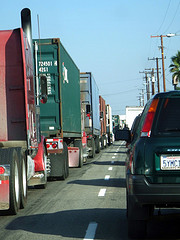
Health and environmental concerns have arisen regarding a Los Angeles truck expressway proposed by the California Department of Transportation (Caltrans). Local residents and environmental activists filed a lawsuit in late September in Los Angeles Superior Court challenging the plan to construct a new four-lane roadway over the Cerritos Channel, the Los Angeles Times reported.
The Natural Resources Defense Council has teamed up with two local community groups in the legal battle against Caltrans. The neighborhoods surrounding the proposed expressway have joined the fight also, as they already experience some of the worst air conditions in the country, the Times said.
Elva Carrillo, who runs a small private school in Wilmington, just 750 feet away from the proposed truck expressway, told the Times that “[t]here are at least 21 to 28 days a year when the air is so bad here that we do not let the children go outside to play.”
“You can feel the trucks rumble, day and night,” she said. “How much more should we endure?”
The truck expressway would replace the 61-year-old Schuyler Heim Bridge, which spans across the Cerritos Channel, connecting Terminal Island and Wilmington. The proposal includes a four-lane elevated roadway connection to Alameda Street, bypassing five railroad crossings and three intersections, the Times reported.
Chief executive of the Alameda Corridor Transportation Authority, John Doherty, told the paper that the truck expressway would reduce truck congestion on the freeway by as much as 10 percent as well as emissions from trucks that idle along nearby surface streets. He added that the project will lead to 11,000 jobs and $47 million in state and local taxes.
The plaintiffs have asserted, however, that the environmental review underestimated the project’s traffic outlook. They also argue that Caltrans made no serious effort to attain an alternative path for the expressway or even to incentivize the use of clean energy vehicles along the route, the Times said.
The ports depend on the trade coming in, and whether or not Los Angeles retains its market in international trade may depend on this case. However, the wellness of the surrounding communities hangs in the balance as well, and their lives will be impacted the most by the proposed expressway.

